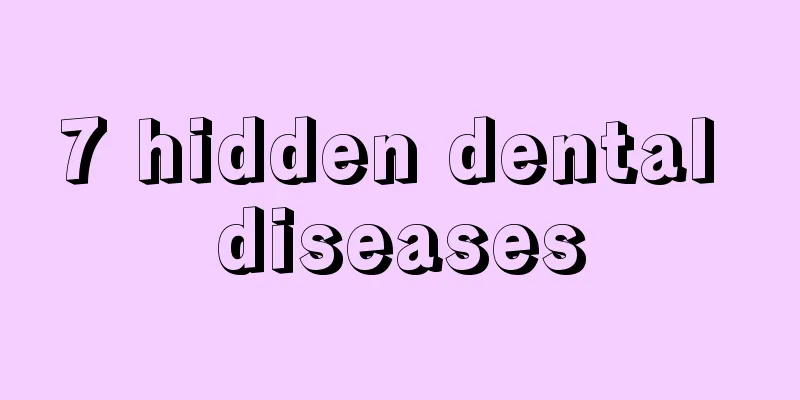7 hidden dental diseases

|
Problems with teeth can bring various inconveniences to our lives. The most obvious one is that it affects our enjoyment of delicious food. If the disease is accompanied by pain, it can even make people depressed and affect their quality of life. But do you know that various dental symptoms may be a precursor to problems in various aspects of the body? When we are treating dental diseases, we must also be alert to the various symptoms that may indicate dental diseases and discover them early. Gums wrap around teeth, adverse drug reactions If you are taking immunosuppressants, medications for heart disease or stroke prevention, your gums may thicken and even wrap around your teeth. Certain medications can cause the gums to grow again, making it difficult to clean your teeth and leading to tooth decay and periodontitis. At this time, you need to tell your doctor to adjust the dosage of the medicine. Loose teeth, osteoporosis Loose teeth indicate that your body does not contain enough calcium and you are more likely to have osteoporosis. There is no good remedy for this situation, but we can prevent it early, such as taking calcium tablets early, doing jumping and vibration exercises, and frequently tapping your teeth. Bleeding gums, hepatitis If your gums continue to bleed and your wounds are slow to heal, this could be the result of hepatitis. After liver cells are damaged, the liver's ability to produce coagulation factors decreases, leading to coagulation disorders. Generally, hepatitis patients with bleeding gums can take vitamin C, vitamin K and other hemostatic drugs to alleviate the condition. Swollen and painful teeth, stomach heat When teeth become swollen and painful, it often reflects stomach problems in terms of its relationship with the internal organs. Stomach heat is often the cause of swollen and painful teeth, and is also accompanied by thirst, constipation, nausea, abdominal distension, etc. In severe cases, the teeth may become severely red and swollen, and then develop into gum erosion. Tooth lengthening, diabetes The saliva of diabetic patients has a high sugar content, which is conducive to bacterial growth. At the same time, the calcium content in the saliva increases, which also makes it easy to form stones. These will increase the risk of periodontal disease, dental caries and other diseases. As this situation gradually develops, you will find that your teeth begin to grow longer, which is actually the result of gum recession. Cracked teeth, gastroesophageal reflux disease Cracks in teeth are caused by thinning of the enamel, which is not a symptom of aging and is often related to acid reflux. This chronic disease allows stomach acid to reflux into the esophagus, and a small amount of it enters the mouth, corroding the teeth. It is usually caused by lesions in the anti-reflux barrier between the esophagus and stomach. Gum wounds are difficult to heal, oral cancer If a gum wound does not heal within a week or two, or if the mucosa in a certain area remains white or red for a long time instead of the normal pink, you should see a doctor to rule out the possibility of oral cancer. |
<<: Singing has three major benefits to your health
>>: 10 health tips for traveling
Recommend
What are the pillows for a good sleep
Basically one-third of a person's life is spe...
What are the new methods to prevent tongue cancer
No one can avoid seeing a doctor in life, and no ...
What are the dangers of lack of sleep
Lack of sleep is very bad for health, but many pe...
Does endocrine blood test require fasting?
The endocrine system is an important part of the ...
Is there musk in mosquito coils?
In summer, people are not only troubled by the hi...
What sex position makes it easier to get pregnant?
Whether male or female, there are many things to ...
Will adults get sore throat by drinking milk powder?
If adults drink milk powder for a long time, they...
The stomachache is relieved by farting
In life, many people do not pay attention to thei...
What harm do cockroaches do to humans?
Everyone hates cockroaches. Cockroaches can be fo...
There are so many types of stomach diseases
Gastric disease is a relatively common disease am...
What are the correct treatment principles for vitiligo
Normally we rarely see patients with vitiligo, si...
What are the symptoms of fibroids
In daily life, fibroids are very common. When thi...
What to do if your nose is itchy due to allergies? There are methods for allergic rhinitis
The most common cause of nasal itching is allergi...
The signs of depression before suicide are as follows
I believe everyone has heard of depression. This ...
What should I do if my contact lens moves behind my eyeball?
Do you want to wear glasses to be more fashionabl...









